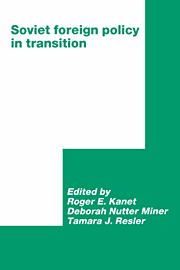Book contents
- Frontmatter
- Contents
- List of tables
- List of contributors
- Preface
- Introduction
- Part I The Soviet Union and the international political system
- Part II The Soviet Union and Europe
- 2 The changing Soviet–East European relationship
- 3 Soviet–Nordic relations in the era of perestroika and new thinking
- 4 Soviet signals to the Nordic countries during the Lithuanian crisis of 1990
- 5 Neutrality and new thinking
- Part III The Soviet Union and the developing world: global trends
- Part IV The Soviet Union and the developing world: regional and country case studies
- Part V Conclusion
- Index
4 - Soviet signals to the Nordic countries during the Lithuanian crisis of 1990
Published online by Cambridge University Press: 05 February 2012
- Frontmatter
- Contents
- List of tables
- List of contributors
- Preface
- Introduction
- Part I The Soviet Union and the international political system
- Part II The Soviet Union and Europe
- 2 The changing Soviet–East European relationship
- 3 Soviet–Nordic relations in the era of perestroika and new thinking
- 4 Soviet signals to the Nordic countries during the Lithuanian crisis of 1990
- 5 Neutrality and new thinking
- Part III The Soviet Union and the developing world: global trends
- Part IV The Soviet Union and the developing world: regional and country case studies
- Part V Conclusion
- Index
Summary
At the beginning of 1990 Gorbachev and the Soviet leadership were confronted by the specter of Lithuania's becoming the first Soviet republic to declare its independence. In December 1989 the Lithuanian Communist Party, led by Algirdas Brazauskas, declared its independence of the Soviet Communist Party. Elections to the national assemblies of all republics were scheduled for March, and it was evident from the atmosphere in Lithuania that a newly elected parliament would declare the republic's independence. This is, in fact, what happened on 11 March 1990.
It was a matter of urgency for the Soviet leadership to prevent other states from recognizing such a declaration of independence. Making it clear to the world that Moscow would not accept an independent Lithuania thus became an important objective.
The aim of this study is to analyze Soviet signaling to the rest of the world in a bid to prevent recognition of Lithuanian independence. Although American reactions to events in Lithuania were undoubtedly of most interest to Moscow, the focus of this chapter will be on crisis communication between the Soviet Union and its small neighbors to the northwest. With their geographical proximity, historical ties, and groups of exiled Balts, the Nordic countries followed the course of events in the Baltic region with particular interest, and the stances they adopted were arguably not without political importance. Soviet policy toward the Nordic countries thus can be considered an important aspect of Soviet policy toward the West in general.
- Type
- Chapter
- Information
- Soviet Foreign Policy in Transition , pp. 70 - 99Publisher: Cambridge University PressPrint publication year: 1992



